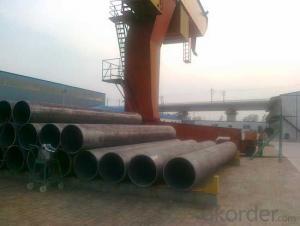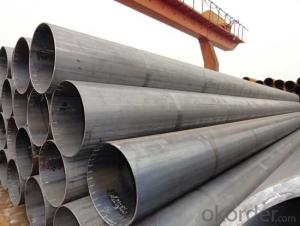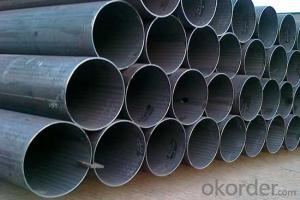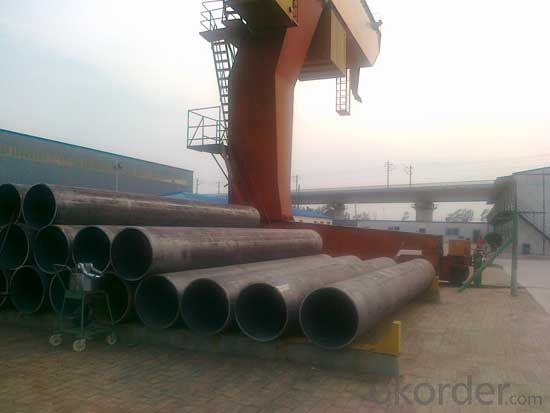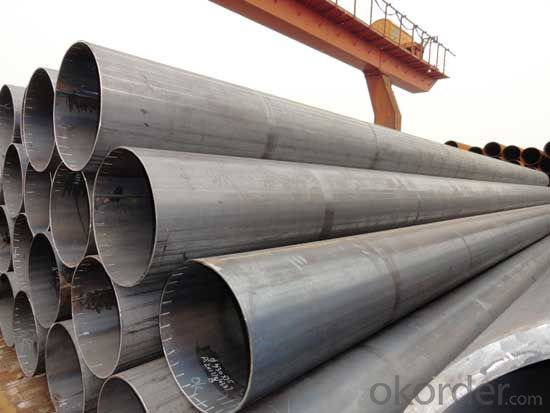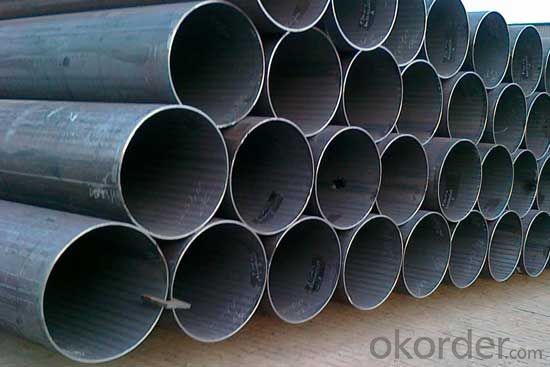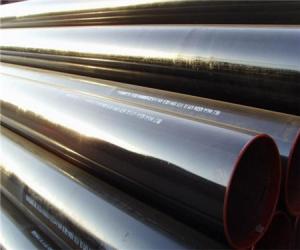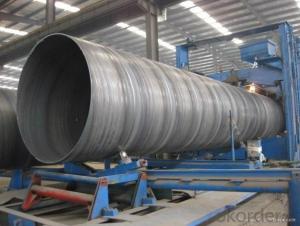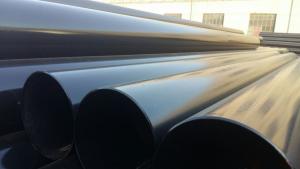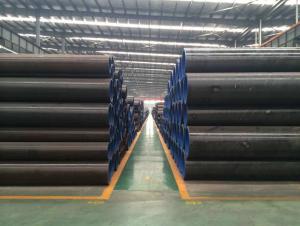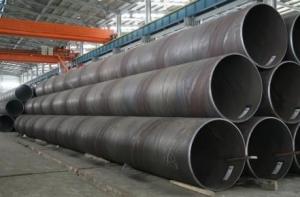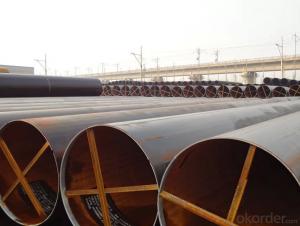LSAW Steel Pipe API Double Submerged Arc Welded Steel Pipe for Construction Structure
- Loading Port:
- Tianjin
- Payment Terms:
- TT or LC
- Min Order Qty:
- 5 m.t.
- Supply Capability:
- 10000 m.t./month
OKorder Service Pledge
OKorder Financial Service
You Might Also Like
LSAW Pipe
LSAW / Longitudinally Submerged Arc Welded Steel Pipe
Outer Diameter: 400-1520mm
Wall Thickness: 8mm ~ 50mm
Length: 3m ~ 12.3m
Standard / Steel Grade
API5LPSL1/PSL2Gr.B,X42~X80,ASTMA252Gr.2,Gr.3,ASTMA53Gr.B
EN10217-1,EN10219-1,EN10025 S235JR,S275JR,S355JR, EN10224 L235,L275,L355,DIN 1629 ST37,ST44,ST52
GB/T9711.1-1997,GB/T9711-2011: L245~L555
GB/T3091-2008:Q235B,Q345B,20#,16Mn etc.
Usage
For conveying petroleum, natural gas, coal gas,drainage,water, chemical material and other medium/low pressure liquids and used for piling project, electric power projects, heat-supply, shipbuilding & construction projects.
Delivery Condition
Beveled or plain ends with or without protector or protective caps with or without varnish/2PP/2PE/3PE/ 3PP/FBE external anti-corrosive coating with or without cement mortar/ /Liquid type epoxy resin/ FBE internal anti-corrosive coating as per customer's requirements
- Q: How are steel pipes protected against electrolytic corrosion?
- Various methods can be employed to safeguard steel pipes against electrolytic corrosion. One commonly utilized approach involves the application of protective coatings on the pipe's surface. These coatings serve as a barrier, effectively preventing direct contact between the steel and the surrounding environment, which may contain moisture and other corrosive substances. Epoxy, polyethylene, and zinc are frequently employed coatings for this purpose. Another means of protection involves the utilization of sacrificial anodes. These anodes, typically fabricated from a metal that exhibits greater reactivity than steel, such as zinc or aluminum, are affixed to the steel pipes. Over time, as these anodes corrode, they willingly sacrifice themselves in order to shield the steel. This process, known as cathodic protection, is exceptionally successful in deterring electrolytic corrosion. Aside from coatings and sacrificial anodes, proper insulation and electrical isolation play a pivotal role in preventing electrolytic corrosion of steel pipes. Insulating materials, such as rubber or plastic sleeves, are employed to prevent direct contact between the pipes and other metals or electrolytes. Electrical isolation can be achieved through the use of dielectric unions or insulating flanges, which effectively obstruct the flow of electric current between different sections of the pipeline. Furthermore, regular maintenance and inspection are essential components of protecting steel pipes against electrolytic corrosion. Regular checks to assess coating integrity, anode condition, and potential electrical leakage are crucial in maintaining the ongoing efficacy of the corrosion protection system. In conclusion, a combination of protective coatings, sacrificial anodes, insulation, electrical isolation, and regular maintenance is indispensable in safeguarding steel pipes against electrolytic corrosion. By implementing these measures, the lifespan of steel pipes can be substantially prolonged, thereby ensuring the safety and reliability of various applications, including water distribution, oil and gas transportation, and structural support in buildings and infrastructure.
- Q: Are steel pipes suitable for industrial cooling systems?
- Yes, steel pipes are suitable for industrial cooling systems. They are highly durable, resistant to corrosion, and can withstand high pressures and temperatures. Additionally, steel pipes have excellent heat transfer properties, making them efficient for cooling applications.
- Q: What are the different end finishes available for steel pipes?
- Steel pipes have various end finishes available, depending on the specific application and requirements. Some common options include: 1. Plain End: The simplest and most common type, where the pipe ends are cut square without any additional treatment or threading. 2. Beveled End: This involves an angled cut at the end of the pipe, typically at a 30-degree angle. It facilitates better welding and ensures a seamless transition between pipes. 3. Threaded End: These ends are useful for connecting pipes with other components using threaded fittings. The pipe ends are cut with external threads, allowing for easy assembly and disassembly. 4. Coupling End: Similar to threaded ends, coupling ends have internal threads. This enables pipes to be connected using couplings or connectors. 5. Grooved End: This type is commonly used in fire protection systems or other applications that require quick and easy installation. The pipe ends are grooved, and a coupling is used to connect and secure the pipes. 6. Flanged End: Flanged ends have a flat, wide surface with holes for bolts. They are used when the pipe needs to be connected to other components using flanges, such as in piping systems or equipment connections. Each of these end finishes serves a specific purpose and is chosen based on the application's requirements. The selection depends on factors like the desired type of connection, intended use of the pipe, and the applicable industry standards and regulations.
- Q: How do you calculate the pressure drop in a steel pipe?
- When determining the pressure decrease in a steel pipe, various factors need to be taken into account. These factors include the pipe's diameter and length, the fluid's flow rate, and the fluid's properties. One commonly utilized equation for calculating the pressure drop in a pipe is the Darcy-Weisbach equation. This equation is as follows: ΔP = (f * (L / D) * (ρ * V^2)) / (2 * D) In this equation: - ΔP represents the pressure drop in the pipe - f denotes the Darcy friction factor, which relies on the pipe's roughness and Reynolds number - L refers to the pipe's length - D represents the pipe's diameter - ρ signifies the fluid's density - V indicates the fluid's velocity To compute the Darcy friction factor, different methods can be employed depending on the flow regime. For laminar flow, the formula f = 16 / Re can be utilized, where Re represents the Reynolds number. For turbulent flow, the friction factor can be determined using various methods, such as the Colebrook equation or the Moody chart. It should be noted that the fluid's properties, such as viscosity and density, may vary with temperature and pressure. Thus, considering these variations is crucial when calculating the pressure drop. Moreover, it is important to acknowledge that additional factors, including fittings, valves, and elbows, can impact the pressure drop in a steel pipe. These factors introduce extra losses, which can be accounted for by employing appropriate correction factors or directly measuring the pressure drop across these components. Overall, calculating the pressure drop in a steel pipe necessitates the use of suitable equations, taking into account the fluid's properties, and considering the various factors that can influence the flow. It is advisable to consult relevant engineering handbooks or employ specialized software for accurate calculations.
- Q: How are steel pipes used in the construction of nuclear power plants?
- Steel pipes are widely used in the construction of nuclear power plants for various critical applications. They are employed in the primary coolant system, where they carry and circulate the pressurized water or liquid metal coolant that transfers heat from the reactor core to the steam generator. Steel pipes are also utilized in the secondary coolant system, which transports the generated steam to drive the turbine for electricity production. Additionally, steel pipes are used for the construction of various auxiliary systems, such as the emergency cooling system or the ventilation system, ensuring the safe and efficient operation of nuclear power plants.
- Q: Can steel pipes be used for underground fire hydrants?
- No, steel pipes are not typically used for underground fire hydrants. Underground fire hydrants are usually constructed using ductile iron pipes as they provide greater strength, durability, and resistance to corrosion, ensuring reliable water supply during emergencies.
- Q: How are steel pipes classified based on pressure ratings?
- Steel pipes are classified based on pressure ratings into various categories such as Schedule 40, Schedule 80, and Schedule 160, with each schedule indicating the maximum pressure the pipe can withstand.
- Q: How are steel pipes used in the manufacturing of bridges?
- Steel pipes are commonly used in the manufacturing of bridges as they provide structural support and stability. They are used for various purposes such as creating the framework, supporting the weight of the bridge, and constructing the foundations. Additionally, steel pipes are also used in the construction of bridge railings and barriers, ensuring safety for pedestrians and vehicles.
- Q: Can steel pipes be used for chimney flues?
- Yes, steel pipes can be used for chimney flues. Steel pipes are often used in chimney systems due to their durability, heat resistance, and ability to withstand high temperatures. However, it is important to ensure that the steel pipes meet the necessary safety and building code requirements for chimney flues.
- Q: What is a tight steel tube?
- The tight steel tube is called "galvanized steel pipe with sleeve connection" or "flat pipe of steel metal for electrical installation". JDG. The utility model relates to a novel protective conduit for an electric circuit. The connecting sleeve and the metal accessory are provided with a wire pipeline composed of screw fastening connection technology, and the utility model does not need to do cross grounding, welding and covering, and the appearance is silvery white or yellow.
Send your message to us
LSAW Steel Pipe API Double Submerged Arc Welded Steel Pipe for Construction Structure
- Loading Port:
- Tianjin
- Payment Terms:
- TT or LC
- Min Order Qty:
- 5 m.t.
- Supply Capability:
- 10000 m.t./month
OKorder Service Pledge
OKorder Financial Service
Similar products
Hot products
Hot Searches
Related keywords
